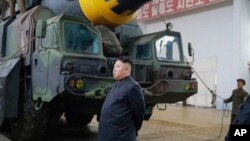North Korea appears determined to make headway in its nuclear and missile programs, despite South Korea's diplomatic overture aimed at restoring peace on the divided peninsula, U.S. experts say.
Since taking office this month, President Moon Jae-in, of the Democratic Party of Korea, is taking a more moderate approach to the North compared with those of two previous presidents, expressing his willingness to meet with North Korean leader Kim Jong Un under the right conditions and making conciliatory gestures.
A spokesman for South Korea's Unification Ministry said Monday that it would consider allowing nongovernmental exchanges with the North, but only within the scope of international sanctions against Pyongyang. In 2010, Seoul imposed the "May 24 Measure," which banned nearly all exchanges between the two Koreas, in retaliation for an attack by the current leader's father, Kim Jong Il, on a South Korean navy ship.
Flexibility absent
"North Korea has no apparent interest in reconciliation with the new [South Korean] government, or in showing any diplomatic flexibility at all," Jonathan Pollack of the Brookings Institution's Center for East Asia Policy Studies told VOA's Korean service.
Despite international calls to halt its nuclear and missile programs, Pyongyang remains obdurate, ramping up the testing cycle for its missile systems. On Sunday, the reclusive regime fired another ballistic missile into waters off its east coast, the second test within a week.
The North's state-controlled KCNA news agency said Sunday's launch of a new intermediate-range solid-fuel rocket, which traveled about 500 kilometers (310 miles) and reached an altitude of 560 kilometers (348 miles), proved progress in North Korea's stated goal of acquiring full nuclear weapons capabilities to strike the U.S. mainland. For decades, North Korea has claimed that its nuclear weapons are necessary to counter U.S. aggression.
Given Pyongyang's continued weapons testing, analysts say Kim's intentions are clear — he has no interest in diplomacy, even with South Korea's pro-engagement Moon, nor does he want to stop or reverse his nuclear weapons program.
"North Korea will not negotiate what it sees as necessary for its survival regardless of how much pressure is applied by the outside world," said Bonnie Glaser, a senior adviser for Asia at the Center for Strategic and International Studies, a Washington research group.
Eye on future talks
Other analysts attribute Kim's resolve to develop a reliable nuclear weapons capability to an effort to raise the stakes in future negotiations with South Korea and the U.S. to push for economic support and pledges of nonaggression.
"North Korean missile technology advances with each test, heightening the threat against the U.S. and North Korea's neighbors and potentially increasing North Korea's leverage if and when there are talks with either Washington or Seoul," said Sue Mi Terry, a former senior North Korea analyst with the CIA and currently managing director for Korea of BowerGroupAsia, a public policy consulting firm in Jakarta.
Michael O'Hanlon, a senior defense expert at the Brookings Institution, a Washington think tank, also said he thought North Korea was trying to "establish the terms of any future negotiations with Seoul and Washington and create certain facts on the ground.'"
"Pyongyang did something similar when President [Barack] Obama was inaugurated," said O'Hanlon, in reference to the North Korean nuclear test in the spring of 2009. "I believe they are following a similar pattern now with Moon and [U.S. President Donald] Trump — making clear they won't be intimidated, making clear they won't be pushovers, trying to create some real chips they can consider negotiating away, or not, if the price is right."
No outreach, no change
But Ken Gause of the International Affairs Group at the Center for Naval Analyses, a research center for the U.S. Navy and Marine Corps, added that unless Moon further softened his approach, making significant concessions and aid to Pyongyang, the regime would continue its brinksmanship and there would not be any negotiation.
"Unless Seoul reaches out to North Korea with substantive aid, don't expect anything to change," Gause said. "All the Moon administration said is that diplomacy can't take hold unless the testing stops, and that is not enough to change Kim Jong Un's calculus.
"Whether the Moon administration is willing to go down this road, Pyongyang is willing to cease its testing at this point and the U.S. will support such an initiative remain to be seen."
Jenny Lee contributed to this report, which originated with VOA's Korean service.






